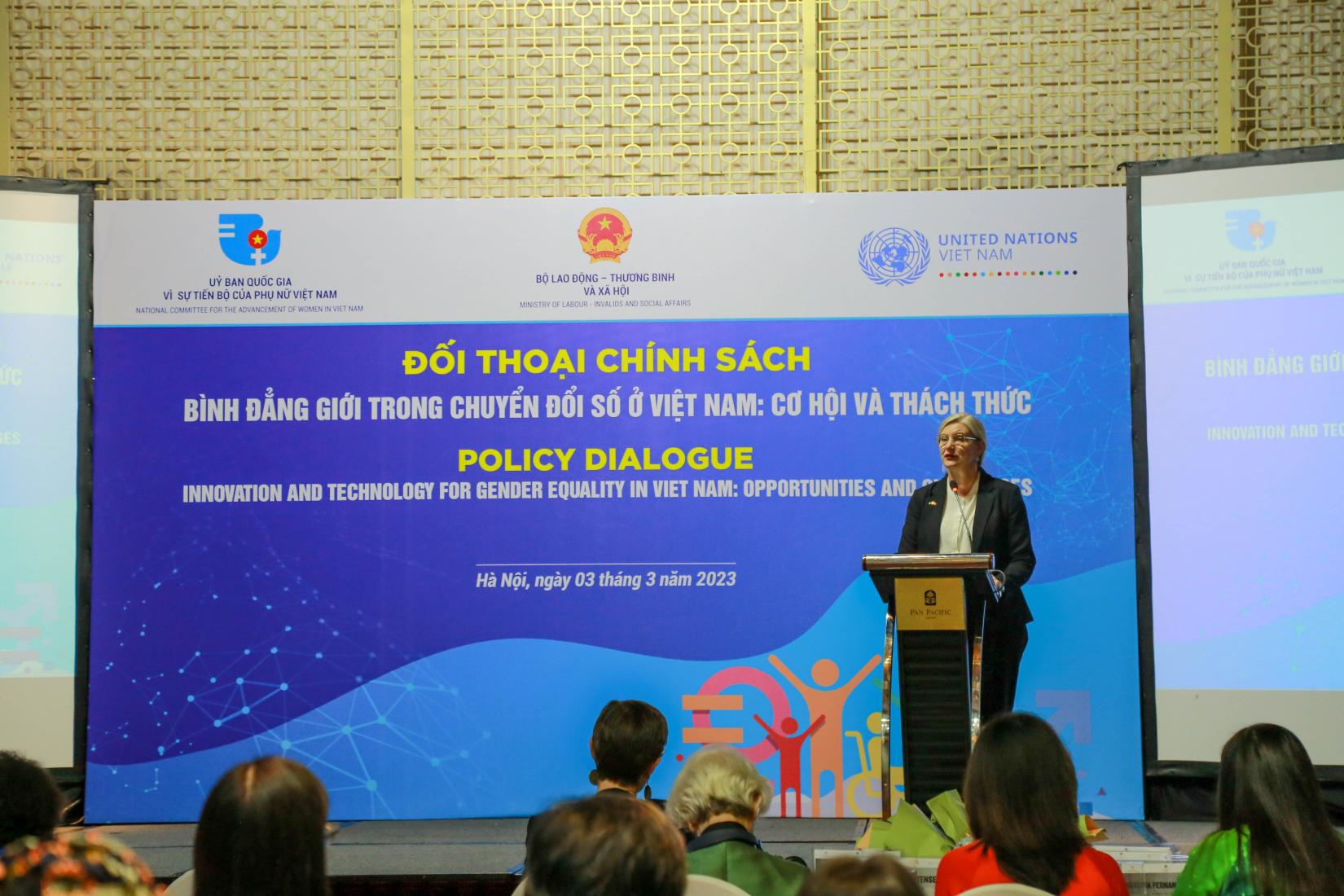Ambassador of Sweden to Viet Nam | Policy Dialogue: “Gender equality in digital transformation in Viet Nam: Opportunities and challenges”
Speech by H.E. Ms. Ann Måwe, Ambassador of Sweden to Viet Nam

Minister Dao Ngoc Dzung, Minister of Labour, Invalids and Social Affairs (MOLISA)
Resident Coordinator of the UN in Vietnam, Ms. Pauline Tamesis
Representatives of Ministries of Science and Technology, Planning and Investment, Information and Communication
Dear colleagues from Embassies, UN agencies and international organisations
Members from civil society, the media and business sector
Gender equality is not only a human rights issue, but also a critical component of sustainable development and economic growth.
Vietnam is a country with great potential, and its economic growth over the last decades is a testament to its progress. However, gender inequality remains an issue which is limiting the country’s potential for further development.
For instance, there are still gaps in gender equality such as glass ceilings to reach top positions, gender stereotypes, and limited opportunities for women in various sectors.
Women continue to be underrepresented in the STEM fields (Science, Technology, Engineering and Mathematics). Gender-based violence also remains a major challenge that needs to be addressed urgently.
Digitalization presents a unique opportunity to close the gender gap and promote economic growth. It has the potential to create new industries, new jobs, and increase efficiency in existing ones.
It is also an essential tool for promoting women's economic empowerment, agency and entrepreneurship, especially in poor and rural areas. This week, as VGCL reports that 100.000 of workers get there working hours cut or are being laid off, digitalization is part of the solution.
Women makes up roughly half the population, and as Vietnam embarks on its national digital transformation strategy till 2025 - with an orientation towards 2030, it is essential to ensure that women are equally represented and have the same opportunity to gain new skills, become innovators, leaders, and champions in digitalization.
According to the World Economic Forum, gender equality is positively correlated with a nation's competitiveness, and countries with higher levels of gender equality tend to have more developed digital economies.
By promoting gender equality in the tech sector, Vietnam could attract more foreign investment, move up the value chain and increase its competitiveness in the global marketplace.
To address these challenges, we need to work together in partnership. International partners including the EU and Sweden can contribute by supporting initiatives that promote gender equality, including in the field of digitalisation.
Sweden currently holds the Presidency of the EU in the spring of 2023. The Sweden’s EU Presidency recognizes that gender equality is crucial for achieving the UN sustainable development goals in building an inclusive society.
The EU Gender Action Plan III, for 2021 to 2025, is a good example of our joint commitment in this endeavor. Among other goals, this plan is designed to promote gender-responsive digitalization and ensure that women and girls have equal access to and can fully participate in the digital economy.
In order to engage Vietnamese youth, the EU has also launched a project in Hanoi, Da Nang, and Ho Chi Minh City that aims to address gender stereotypes and promote gender equality. This project provides a platform for young people to share their experiences and perspectives on gender issues and to develop innovative solutions to address them.
Because the gender divide in tech starts with the gender stereotyping of boys and girls – girls get dolls to play with, boys get tech -toys. Boys are more encouraged to focus their studies on STEM. And boys spend considerably more time gaming than girls, making them more familiar with the latest technologies. There are fewer female role models in tech- business and its harder for female tech- entrepreneurs to access capital for scaling up their business.
That’s why we also have to work with the business sector to promote gender equality. The Embassy of Sweden is engaging with our Swedish companies like Ericsson, IKEA, TetraPak, ABB and H&M to mention a few, which have already shown strong commitment to promoting gender equality and women's empowerment in their operations and supply chains.
Given the above and for the sake of the dialogue today, I would like to offer some key thoughts as we discuss how to promote women's advancement via digitalization:
-One good strategy for Vietnam to achieve gender equality is to invest in education and skills training for girls and women. By promoting and providing equal access to education, especially in science, technology, engineering, and mathematics (STEM), women and girls can develop the skills necessary to adapt and succeed in the digital era.
-Another critical aspect is to create an enabling environment for women in the workplace. This includes implementing policies that promote work-life balance, providing equal pay for equal work, and addressing discrimination and harassment in the workplace.
-Let me end by emphasizing that promoting gender equality is a shared responsibility. It requires a concerted effort from governments, the private sector and the civil society. We look forward to continuing our partnership with all three to promote gender equality through digitalization in Vietnam.
Xin cam on rat nhieu!

















